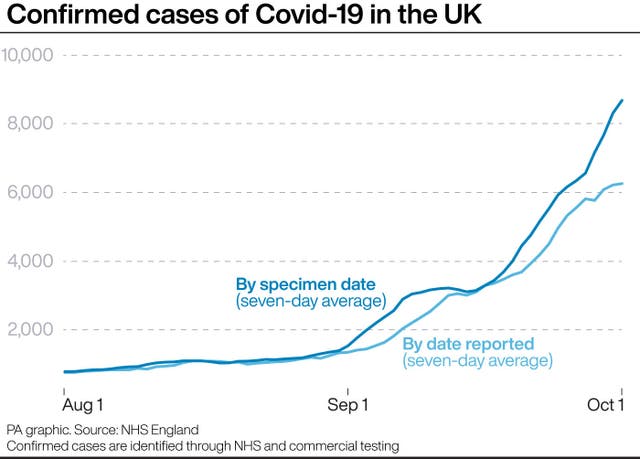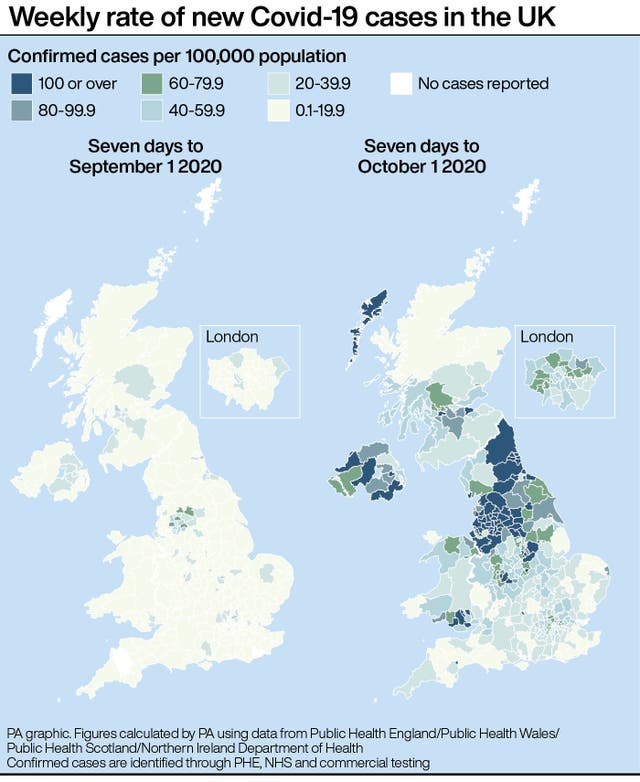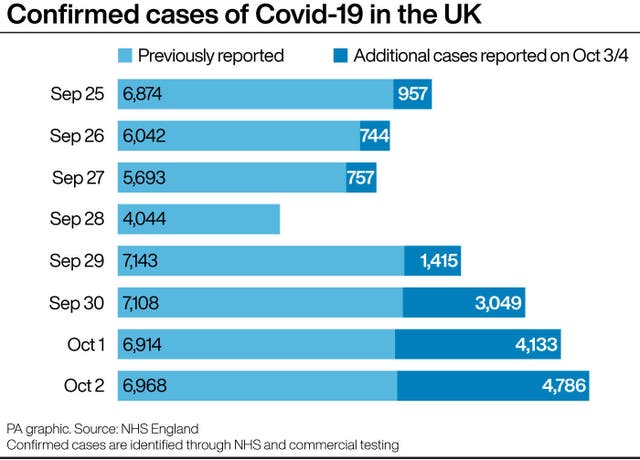Coronavirus cases data issues should never have happened – Hancock
The incident is believed to have been caused by the transfer of data by Public Health England from labs to NHS Test and Trace.

Data issues that stopped almost 16,000 coronavirus cases being recorded in England – delaying contact tracing efforts – should never have happened, the Health Secretary has said.
Matt Hancock told MPs that a technical problem over the weekend occurred with the system “that brings together” data from NHS test sites and tests processed by commercial firms.
Public Health England (PHE) told the PA news agency that the issue had been caused by an Excel file maxing out during an automated process.
It said files had now been broken down into smaller, multiple files to avoid the issue happening again.
It is understood that data from labs was being pulled into Excel templates by PHE so it could then be uploaded to a central system and made available to NHS Test and Trace.
Mr Hancock said it had been decided in July that the PHE “legacy system” needed an upgrade, with contracts for a new system awarded in August.

He said 51% of people testing positive had now been contacted by the system, telling the Commons: “Contact tracing of these cases began first thing Saturday.
“We brought in 6,500 hours of extra contact tracing over the weekend and I can report to the House as of 9am today 51% of the cases have now been contacted a second time for contract tracing purposes.
“I want to reassure the house that outbreak control in care homes, schools and hospitals has not been directly affected because dealing with outbreaks in these settings does not primarily rely on this PHE system.”
Mr Hancock said it was “critical that we work together to fix these issues that were themselves identified by PHE staff working hard late on Friday night.”

He added: “This incident should never have happened but the team has acted swiftly to minimise its impact and now it is critical that we work together to put this right and make sure it never happens again.”
Regarding the scale of the pandemic, Mr Hancock said the Government’s assessment has “not substantially changed” after the error, which was being investigated fully.
“This morning the Joint Biosecurity Centre (JBC) presented to me their updated analysis of the epidemic based on the new figures,” he said.
“The chief medical officer (Chris Whitty) has analysed that our assessment of the disease and its impact has not substantially changed as a result of these data.
“The JBC has confirmed that this has not impacted the basis on which decisions about local action were taken last week. Nevertheless, this is a serious issue that is being investigated fully.”
Analysis by the PA news agency shows that the weekly rate of new Covid-19 cases has soared in dozens of areas of England following the blunder.

Manchester now has the highest rate in England, with 2,927 cases recorded in the seven days to October 2 – the equivalent of 529.4 cases per 100,000 people, up from 246.4 in the previous week.
Knowsley in Merseyside has the second highest rate, up from 324.1 to 498.5, with 752 new cases, and Liverpool is in third place, up from 306.4 to 487.1, with 2,426 new cases.
The analysis, based on PHE data published on Monday, also shows sharp rises in Newcastle upon Tyne, Nottingham, Leeds and Sheffield.
The Government said that, as of Monday, there had been a further 12,594 lab-confirmed cases of coronavirus in the UK, and another 19 deaths – taking the total to 42,369.
PHE said over the weekend that the technical issue resulted in 15,841 cases between September 25 and October 2 being left out of the reported daily coronavirus cases.
It said the outstanding cases were transferred to NHS Test and Trace “immediately” after the issue was noted and all cases were passed on to tracers by 1am on Saturday.
Shadow health secretary Jonathan Ashworth said problems with testing were “putting lives at risk”, adding Mr Hancock “should apologise”.
He told the Commons: “In recent weeks we’ve had people told to travel hundreds of miles for a test, we’ve had hundreds of children out of school unable to get a test. We’ve had tracers sitting idle watching Netflix. We’ve had care home tests taking days to be processed.
“Yesterday we had a health minister saying this could be a moment of national pride like the Olympics.
“We’ve had a Prime Minister in a complete muddle over the rules and now, at one of the most crucial points in this pandemic, we learn that almost 16,000 positive cases went unreported for a week.
“That means as many as 48,000 contacts not traced and not isolating.
“Thousands of people blissfully unaware they’ve been exposed to Covid potentially spreading this deadly virus at a time when hospital admissions are increasing and we’re in the second wave.
“This isn’t just a shambles, it’s so much worse than this and it gives me no comfort to say it, but it’s putting lives at risk and he should apologise when he responds.”
Earlier, Paul Hunter, professor of health protection at the University of East Anglia, said “there will be occasional glitches” in a system this size, but added: “I think the thing that surprised me was the size of it – almost 16,000 results going missing over the course of a week is quite alarming, I think.”
Prof Hunter told BBC Radio 4’s Today programme: “If you’re going to do your contact tracing, there is a very short timeframe in which you can do it effectively.”

PHE said every single person who was tested initially had received their test result as normal, with all those testing positive told to self-isolate.
The number of call attempts to contacts of those affected is being increased from 10 to 15 over 96 hours.
Asked on Monday how many contacts of positive coronavirus cases had been missed as a result of the error, Boris Johnson told reporters: “I can’t give you those figures.”
He added: “What I can say is all those people are obviously being contacted and the key thing is that everybody, whether in this group or generally, should self-isolate.”





